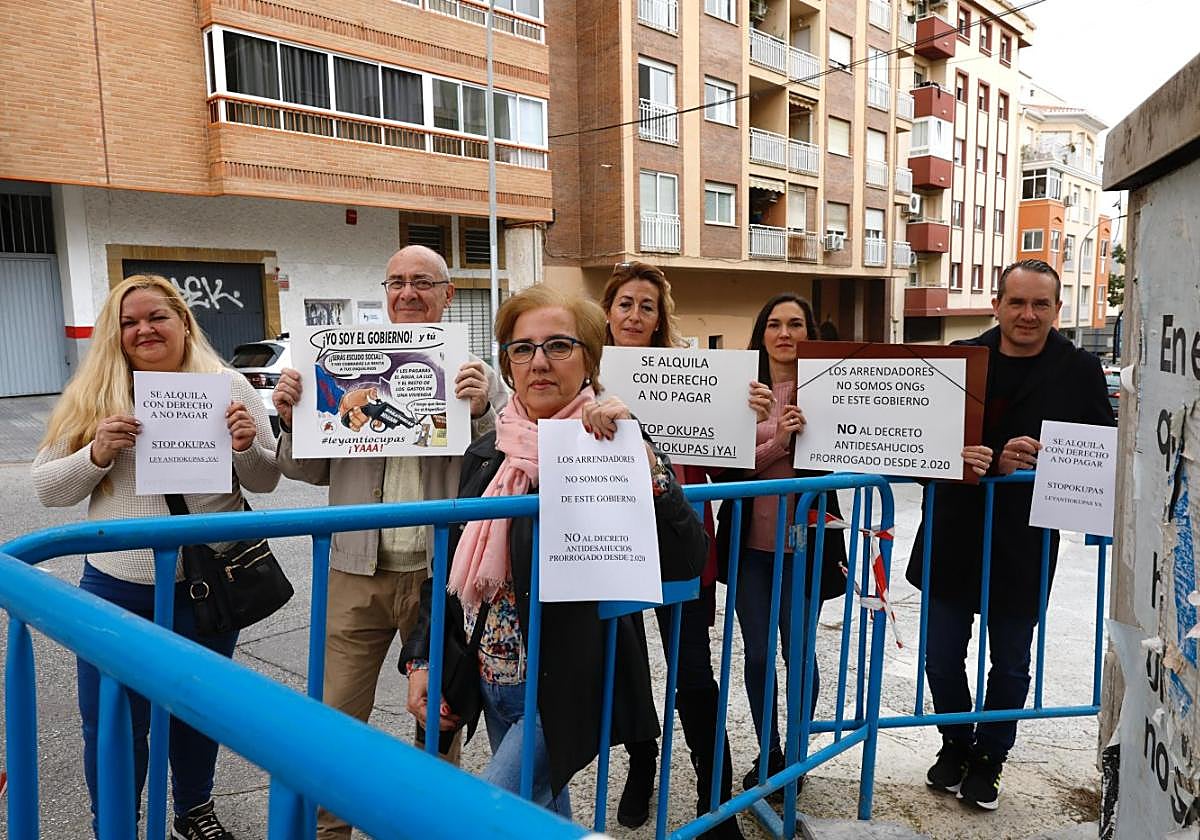Tenants or squatters? When they stop paying but stay put
SUR tells the stories of three families in Malaga who have suffered an ordeal of non-payments, litigation and have even had to resort to hiring private detectives to recover their properties
Chus Heredia
Friday, 26 April 2024, 12:45
The photo is taken in the district of El Ejido, just north of Malaga city centre. Francisco Estévez, a pensioner who has had to deal with a non-paying tenant in his property for two years, is accompanied by his wife, Maribel. Alongside them is Teresa Gutiérrez, who had serious problems with a flat that belonged to her father. Also there are Javier, Virginia and her mother. They have just put an end to a four-year ordeal.
Normally the focus on squatting is more on people who move into someone else's home by force or without permission. A different issue is that of tenants who start paying rent, but at a certain point the payments stop but they do not move out.
The landlords interviewed by SUR share a similar diagnosis. They have lost income, energy and morale along the way. In all three cases they complain that the authorities have failed to follow up claims of vulnerability of tenants. All three are in favour of measures to provide access to housing, but stress that landlords should not be used as a "social shield".
"There is impunity. It's easy to be vulnerable. This is infringing property rights," say the affected owners
An association for property owners affected by squatters, the Plataforma de Afectados por la Okupación, estimates that there may be as many as 80,000 people affected by non-payment in Spain. A government decree, issued following coronavirus, prohibits the eviction of people classified as vulnerable by social services. According to the association, many tenants are clinging to this situation to stay in their homes.
Francisco Estévez and Maribel Bascuñana
Francisco Estévez is retired. He thought he would buy a second property so his son had somewhere to live when he left home. "Now [my son] has to share a flat with three friends paying rent because I don't have the flat; it's been tied up for two years. It's a good thing I didn't put the electricity and water in my name," he says. At the same time he only sees the political route as a solution and that the future law should include non-paying tenants, rather than just squatters. On this point, he points out that the government has refused on more than 20 occasions to receive the Plataforma. Owners with non-paying tenants are the majority, but we are invisible. A large area of impunity is being created. It is easy to be vulnerable. This is infringing property rights," he says.
Estévez has not been paid for two years and for one year he has had a court sentence in his favour but the tenant has a declaration of vulnerability. "The first two years they paid normally. What's more, I signed the contract through the municipal housing institute, and it paid half. But when they stopped paying, I went to the city hall and they just told me to report it. They already owe me 16,000 euros," he says.
He complains that the compensation provided by the Junta in cases of non-payment is partial, full of bureaucracy and takes a long time. "I know people who have even had to sell their homes under pressure from non-payment. It's a good thing I don't have a mortgage on the flat," he adds. The court has requested a new date for the eviction, but he is not optimistic.
Teresa Gutiérrez
Teresa Gutiérrez (not her real name) recounts an intricate odyssey: "My tenant left in February 2022 after two years of non-payment. The contract was in 2016 and was in the name of two people [she later discovered that one was never registered there]. It was a flat that belonged to my father, it was my home, a 52-year-old property. We rented it out to be able to pay rent for my father here in Malaga."
At the beginning, they paid, but not regularly. After three years, the end of the contract, I asked her if they wanted to extend it, but she was on her own. My father died in March of that year, 2019. She was working without a fixed salary, she told me. And her ex-partner is the one who had signed the contract. She told me that she was going to pay with the rental benefit," she adds. The aid never arrived.
From there began an ordeal of lawyers, contacts and litigation with the municipality in question (she prefers not to identify it). The non-payments began to pile up. The tenant went to work for the council and Teresa was reassured that she would pay. She lived with her two children, 18 and 17. "I went so far as to offer her the chance to leave without paying her debt of 9 months and giving her two months to look for an alternative. She refused. I had to sue. It was in October 2020. When the proceedings were activated, it was the second [Covid] state of alarm and everything had to be suspended. I had a trial in March 2021. She had moved faster than I did. She had a court-appointed lawyer and a vulnerability report. I provided the screenshot proving that she was working without a contract," she adds.
The story gets even more complicated from here. She had to hire two private detectives and they discovered that the tenant was working and that the life she led, according to social media, did not correspond to being vulnerable. "We wrote to the judge with the detective's report, the standard of living and my unemployment certificate and my mother's 80% disability. She argued that she had paid me cash in hand, that she had made renovations... The judge declared her not vulnerable," she continues, adding that there were also problems with the neighbours, including complaints of drug use. Meanwhile, it was Teresa herself who was paying "skyrocketing" electricity, water and community fees.
She was able to prove, after spending 2,000 euros on detectives, that this person was not in a vulnerable situation. She even received 1,000 euros a month in benefits and had a property in Zaragoza. The whole process cost Teresa more than 30,000 euros. And a destroyed flat.
Javier Merino and Virginia Robles
Javier and his wife Virginia finally breathed a sigh of relief during the making of this report. "I have just regained possession," Javier, a hotel and catering professional, told this newspaper. "We are in favour of aid but there is no follow-up. A lot of public money is being thrown away. And now the court-appointed lawyers know all the tricks," he says.
The debt of his tenants built up over four years and amounted to 20,000 euros. "This has been an ordeal and lawyers are of little help. I have had to be a detective and we have managed to unmask the vulnerability. I don't understand why social services don't follow this up. And tenants should inform them when they are no longer in that situation. There is public money being embezzled," he criticises.



